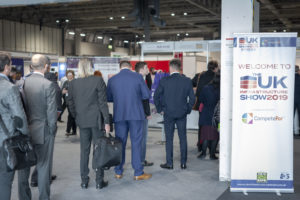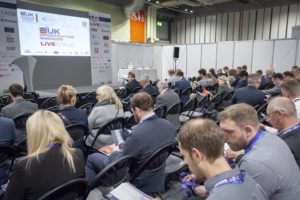30th April saw Birmingham NEC host the popular UK Infrastructure Show 2019.
With over 1,400 delegates enjoying all that the infrastructure subsector has to offer, UKIS 2019 provided the perfect opportunity to catch up on all the latest innovations, opinions and collaborations.
In the packed out keynote arena the audience heard from some of the key figures and organisations in the sector; including Phil Graham Chief Executive of the National Infrastructure Commission, Matthew Vickerstaff Chief Executive Infrastructure Projects Authority, the Department of Transport and HS2 Ltd.
Key themes from the speakers emerged as collaboration, innovation and a long-term approach to delivering some of the biggest infrastructure challenges ongoing, not just in the UK but Europe, today.
With infrastructure encompassing a wide range of projects; from coastal flooding to sewerage, rail implementation to smart motorways, digital communications to energy, UKIS 2019 took the opportunity to split the exhibition into zones.
Highlighting two of the areas which have seen multiplying contracts over the last year, further information, speakers and collaboration opportunities could be found in the Energy and Social Infrastructure and Transport zones.

In Zone 1: The Energy and Social Infrastructure zone, attendees heard from a range of specialists and suppliers working in the sector, including:
- Jonathan Bretherton, Managing Director, Urban Growth Company
- Khaldon Evans, Architectural Designer, Site Diary
- David Brown, Associate Director, CompeteFor
- Alexander Goodall, Head of Corporate Solar, Statkraft
- Simon Gamage, Planning Director, RPS
The themes of collaboration and innovation was at the heart of discussions here, with valuable insights provided to those attending the sessions.
Over in Zone 2: Transport, sessions from some of the lead figures in infrastructure development in the West Midlands spoke to a lively audience.
Robin Lapish, Supply Chain Management at HS2, kicked off the session, with a commentary on finding and providing supply chain opportunities on the High Speed Rail development. It is crucial for the company, he said, to engage with suppliers and develop relationships within the supply chain to ensure real value from the project. He encouraged suppliers, within and without the traditional infrastructure supply chain, to engage with HS2 and that collaboration is key to the successful delivery of the project.
The Midlands took centre stage during the workshop, with commentary from:
- Anne Shaw, Director of Network Resilience, transport for the West Midlands
- Elaine Clark, Chief Executive Officer, Midlands Rail Forum
- Sarah Spinks, Stakeholder Management Lead, Midlands Connect
At the heart of the HS2 network and playing host to the connections of east and west, north and south, the Midlands has become central to the developing infrastructure network. Sessions in the Transport Zone highlighted the Midlands importance in creating, developing and nurturing relationships.
Sarah Spinks, Midlands Connect summed this up, saying: “We can make a bigger impact by working together. With the right connections in the right places – in terms of both projects and people – we can provide joined up solutions for our existing fragmented infrastructure”
The Midlands contingent were followed by Amit Puri, Lead consultant at Plangrid, who are providing productivity solutions for the industry. Construction and infrastructure are suffering from productivity issues. As one of the least digitized industries, alongside agriculture, construction is struggling to hit targets. Mega projects typically overrun by 98%, with 20 month average delays and cost increases of some 80%.

By using the latest technology and innovations, and upskilling the workforce to make use of this data, some £15Bn could be saved in productivity improvements.
Last to speak, was Rebecca Young, Skills and Efficiency Strategy Manager at HS2 Ltd. The skills shortage is well-observed within the construction industry, with infrastructure roles in particular suffering.
She reminded us that HS2 is a huge investment in the future, but not just in buildings, it is for people and communities as well. The company has four strategic objectives to fulfill with construction of the railway under its skills strategy, these include: ensuring there are the skills to deliver and leave a legacy for transport; creating sustainable skills, employment and education opportunities; stimulating interest in STEM subjects; and finally to work in partnership with both stakeholders, industry and the government to develop HS2 as a strategic investment for the country.
She left the session contemplating just how big the opportunity is through HS2 to create a lasting legacy for the infrastructure industry, through collaboration, development and innovation.
We would like to thank all delegates, visitors, partners, sponsors and exhibitors at UKIS for helping to make such a successful show and representing an industry with huge potential for growth and development.
The collaboration and opportunities on show at the event certainly inspired industry member and we look forward to welcoming you next year.
Register your interest for next year.
The post UKIS 2019: In the zone appeared first on UK Construction Online.
Walang komento:
Mag-post ng isang Komento